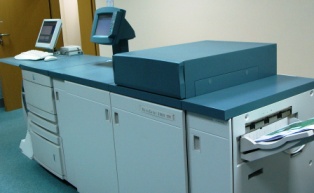Publication on demand - the bridge between paper and e-book
What is print on demand? 
Print on demand is a new idea related to development of digital printing. Digital printing my be prescribe as a typical laser printing but made by huge, commercial presses, usually with high efficiency. Digital printing allows to print color or black and white publication in low circulations on reasonable prices (costs of print do not depend on circulation– almost no economy of scale) with a very short time. Contrary to traditional (book) publishing and, printing on demand (POD) is done usually after receiving order (not before) - that’s why is called print on demand.
Publication on demand system
According to the concept of long tail (shortly - taking profits of niche products, that occupied last positions of your product sales list) WSiP decided to sell its print out books in POD technology. Additionally, it wanted to sell books of other commercial publishers and academic publication using POD concept.
Wsip created and developed a software that allows students via internet to:
search the publications database and take out from that books, articles or any other publications interesting fragments combine all that fragments together - students or other person receives a personalized books. (For instant, student interesting in Digital Business Enhancement is able to search database, find some chapters or fragments from different textbooks, combined them and through that he makes its own textbook about DBE) put an order to print – system makes a printable pdf file that would be delivered to one of the many POD spots - located on universities. At that spots publications is printed and blinded professionally. Books can be also delivered to his door within 2-3 working days
Results?
It looks like a brilliant idea. Who would not want to have possibility to pay only for the interesting parts of the books and have it delivered quickly? But unfortunately, project do not succeed. Problems? (despite the organizational problems). The resistant of authors to allow its book be printed in fragments at POD spots. That is because copyrights fees would be calculated from single page.
Addditionaly, they simply do not want to share with their profits of its book with WSiP. They also afraid of “taking over” by Print on Demand substantial part of traditional print outs – the traditional part of full textbook may decrease.
Future?
Anyway, the whole idea seams to be interesting. It is some bridge that combines traditional textbooks (physical) and electronic (e-books) form of the “content” delivered to learners. It gives much more flexibility of building an own, personalized textbook. Just look at our MBA classes and delivered material. It is very rare we have on source of information, one textbook. Usually it is a set of articles, extracts from different textbooks delivered to us.
Similar systems (POD system) work on some universities (e.g. Oxford) and they succeed.
To sum up the main point of existing of POD is that paper is still more readers-friendly than the screen. But how long?...
Links:
http://www.printondemand.com/
Print-on-Demand - A Technological Revolution in the Publishing World by Grzegorz Boguta
http://www.wyczerpane.pl/- polish web-page with sold out books printed on demand
Oxford POD program

Print on demand is a new idea related to development of digital printing. Digital printing my be prescribe as a typical laser printing but made by huge, commercial presses, usually with high efficiency. Digital printing allows to print color or black and white publication in low circulations on reasonable prices (costs of print do not depend on circulation– almost no economy of scale) with a very short time. Contrary to traditional (book) publishing and, printing on demand (POD) is done usually after receiving order (not before) - that’s why is called print on demand.
Publication on demand system
According to the concept of long tail (shortly - taking profits of niche products, that occupied last positions of your product sales list) WSiP decided to sell its print out books in POD technology. Additionally, it wanted to sell books of other commercial publishers and academic publication using POD concept.
Wsip created and developed a software that allows students via internet to:
Results?
It looks like a brilliant idea. Who would not want to have possibility to pay only for the interesting parts of the books and have it delivered quickly? But unfortunately, project do not succeed. Problems? (despite the organizational problems). The resistant of authors to allow its book be printed in fragments at POD spots. That is because copyrights fees would be calculated from single page.
Addditionaly, they simply do not want to share with their profits of its book with WSiP. They also afraid of “taking over” by Print on Demand substantial part of traditional print outs – the traditional part of full textbook may decrease.
Future?
Anyway, the whole idea seams to be interesting. It is some bridge that combines traditional textbooks (physical) and electronic (e-books) form of the “content” delivered to learners. It gives much more flexibility of building an own, personalized textbook. Just look at our MBA classes and delivered material. It is very rare we have on source of information, one textbook. Usually it is a set of articles, extracts from different textbooks delivered to us.
Similar systems (POD system) work on some universities (e.g. Oxford) and they succeed.
To sum up the main point of existing of POD is that paper is still more readers-friendly than the screen. But how long?...
Links:


